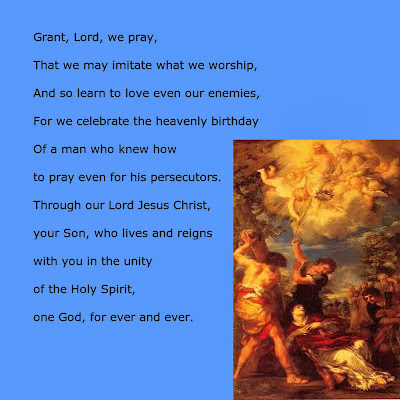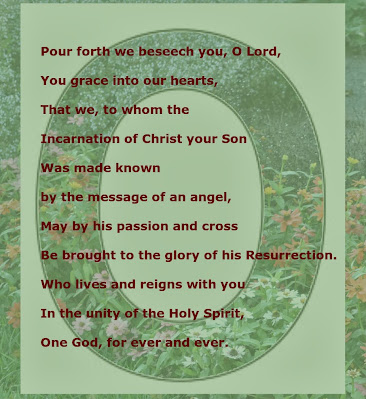Lectionary: 16In times past, God spoke in partial and various ways to our ancestors through the prophets; in these last days, he has spoken to us through the Son, whom he made heir of all things and through whom he created the universe, who is the refulgence of his glory, the very imprint of his being, and who sustains all things by his mighty word.
As we celebrate the Birth of the Lord, a human being through whom all things were created from the greatest galaxies in the sky to the smallest microbes on earth, my readers might indulge me for a moment and let me wonder, "What is a human being?"
The question is worthy of the occasion as we remember that the Lord was born among us and resides among us still as a human being. This is a most astonishing mystery, both unexpected and undeserved; and, by some people's reckoning, inappropriate.
Any answer to the question, of course, must be inadequate for a human being is an incomprehensible mystery, far deeper than the subtlest words might express and the deepest minds might grasp. But periodically we should attempt an answer -- if for no other reason -- to appreciate the glory of Christmas Day. I offer three words: a human being is a system, a story, and a name.
The human being is a system of systems. They include the cardiac system with its blood and blood vessels, plus the digestive, respiratory, excretive, glandular, skeletal, dermal, and nervous systems. All of these systems are comprised of many parts and each has its own structure and purpose, while all depend upon each other to make the human body a living being. The reproductive system is unique for it is only half a system; the complete system is formed when male and female persons come together. All of these amazing systems must work together to become and maintain the one system which I know as myself, and yourself.
But this system of systems, the human being, cannot can exist apart from other systems. At birth we are utterly helpless, depending on the care and nurture of mature parents; and even in maturity, we rely on other persons in a macrosystem of family, society, neighbors, cities, and nations -- with all their increasingly complex infrastructures. And in old age, we continue to rely on other people as we are less able to contribute to the projects of survival, security, and flourishing.
Nor can we ignore the macro and microsystems of the universe around us and within us, from the solar system and oceanic tidal systems to the chemical, atomic, and subatomic. Somewhere in the middle of all that the individual person finds themself. I am a part of all that, and yet mysteriously apart from all that.
So when we celebrate Christmas we are remembering how the Lord God of heaven and earth took his place among us, a system of systems within increasingly complex and interdependent systems. Jesus was never the Lone Ranger, and his energies were never entirely his own. And though his boundaries may have been clear enough, they were never barriers against others people. He relied on others and was reliably there for others.
Secondly, the human being is a history or a story. In his case, a Gospel! But the Lord's story didn't begin with his birth or his conception. It began when time began; with the formation of galaxies and stars. The chemicals that went into his body -- carbon, oxygen, iron, and so forth -- were created as stars formed, collapsed, exploded, and coalesced again and again. It continued with the call of Abraham, Isaac, Jacob, and Joseph. It continued through the history of Israel with stories of Moses and David, Esther and Judith, Mary and Joseph. And it stretches into the infinite future.
Each of us has a story and. like our systems, they're enmeshed and entangled with one another. A family of four will have at least four different versions of an incident, and yet they all agree on its importance. Everyone has a story to tell and we hope each one becomes a gospel as the grace of God gathers us to the Lord. We speak of disappointment and sadness, of healing, reconciliation, and atonement. A good story always includes some form of death and resurrection.
And, thirdly, a human being is a name. We give each other names: formal names, nicknames, official names, insulting names, and so forth. But each of us has one name which we know but cannot speak, a word known only to God. And on that great getting-up morning the Lord will call those who belong to him by their names and they will leap from their graves and go with him into Paradise.
Amid all the systems within the enormous machinery of the universe, Jesus is the Key that makes them work, without which they can neither exist, nor succeed, nor flourish.
And the Lord Jesus belongs in every story for without him our lives, as beautiful and remarkable as they might be, have no end, no purpose. Our suffering would only be tragic, our disappointments, only heartbreak. But because each of us bears the imprint of his being who sustains all things by his mighty word we hope for and expect a resurrection.
And the Lord Jesus has a name above every other name so that every knee must bow and every tongue proclaim that "Jesus Christ is Lord."
"In times past, God spoke in partial and various ways to our ancestors through the prophets:" and they struggled to make sense of it all. Christmas explains it. In the fullness of time, the Lord was born. He lived, died, and was raised up so that we might find our joy in singing the Glory of God.















